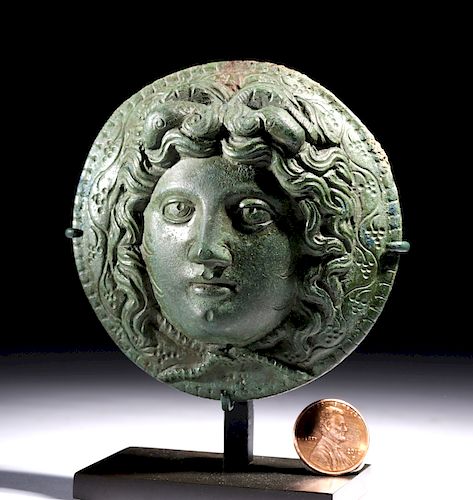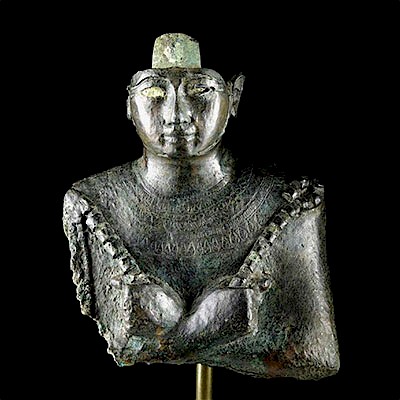Published / Exhibited Roman Bronze Roundel w/ Medusa
Lot 45a
About Seller
Artemis Fine Arts
686 S Taylor Ave, Ste 106
Louisville, CO 80027
United States
Selling antiquities, ancient and ethnographic art online since 1993, Artemis Gallery specializes in Classical Antiquities (Egyptian, Greek, Roman, Near Eastern), Asian, Pre-Columbian, African / Tribal / Oceanographic art. Our extensive inventory includes pottery, stone, metal, wood, glass and textil...Read more
Estimate:
$9,000 - $13,000
Absentee vs Live bid
Two ways to bid:
- Leave a max absentee bid and the platform will bid on your behalf up to your maximum bid during the live auction.
- Bid live during the auction and your bids will be submitted real-time to the auctioneer.
Bid Increments
| Price | Bid Increment |
|---|---|
| $0 | $25 |
| $300 | $50 |
| $1,000 | $100 |
| $2,000 | $250 |
| $5,000 | $500 |
| $10,000 | $1,000 |
| $20,000 | $2,500 |
| $50,000 | $5,000 |
| $100,000 | $10,000 |
| $200,000 | $20,000 |
About Auction
By Artemis Fine Arts
May 22, 2019
Set Reminder
2019-05-22 10:00:00
2019-05-22 10:00:00
America/New_York
Bidsquare
Bidsquare : Exceptional Day 1: Antiquities Asian Fine Art
https://www.bidsquare.com/auctions/artemis-gallery/exceptional-day-1-antiquities-asian-fine-art-4129
Day 1 of an important 2-day auction featuring exceptional art from around the world - Egyptian, Greek, Etruscan, Roman, Viking, Russian, Near Eastern; Asian Art from China, Japan, Thailand, Vietnam, Burma, India; Fine Art from the 17th century to present. Artemis Fine Arts info@artemisgallery.com
Day 1 of an important 2-day auction featuring exceptional art from around the world - Egyptian, Greek, Etruscan, Roman, Viking, Russian, Near Eastern; Asian Art from China, Japan, Thailand, Vietnam, Burma, India; Fine Art from the 17th century to present. Artemis Fine Arts info@artemisgallery.com
- Lot Description
Roman, Imperial Period, ca. 1st to 3rd century CE. A wonderfully-preserved cast bronze roundel, made to be applied decoratively to an item of Roman furniture or armor, featuring a striking face of Medusa. Medusa was the most famous of the three gorgons, human women with venomous snakes for hair. The concept of the gorgon, a frightening, beast-like, female creature, is at least as old as Homer and continued to be used as a monstrous symbol throughout the Roman period, especially popular as decoration on pottery. Here she is depicted as more beautiful than usual, with large, striking eyes that stare straight forward as you gaze upon her and her murderous locks. Size: 3.2" W (8.1 cm); 4.25" H (10.8 cm) on included custom stand.
Exhibited in "Dressed to Kill in Love and War: Splendor in the Ancient World", February 1 - March 31, 2019, Academy Art Museum, Maryland, USA, published in the exhibition guide by Sarah E. Cox and Anke Van Wagenberg, fig. 13.
Provenance: private East Coast, USA collection; ex-William Froelich collection, New York, USA, collected in the 1970s; Exhibited in "Dressed to Kill in Love and War: Splendor in the Ancient World", February 1 - March 31, 2019, Academy Art Museum, Maryland, USA, published in the exhibition guide by Sarah E. Cox and Anke Van Wagenberg, fig. 13.
All items legal to buy/sell under U.S. Statute covering cultural patrimony Code 2600, CHAPTER 14, and are guaranteed to be as described or your money back.
A Certificate of Authenticity will accompany all winning bids.
We ship worldwide and handle all shipping in-house for your convenience.
#146254Smooth, deep green patina and excellent preservation of details. Iron nail on back has encrusted patina.Condition
- Shipping Info
-
All shipping is handled in-house for your convenience. Your invoice from Artemis Gallery will include shipping calculation instructions. If in doubt, please inquire BEFORE bidding for estimated shipping costs for individual items.
-
- Buyer's Premium



 EUR
EUR CAD
CAD AUD
AUD GBP
GBP MXN
MXN HKD
HKD CNY
CNY MYR
MYR SEK
SEK SGD
SGD CHF
CHF THB
THB














